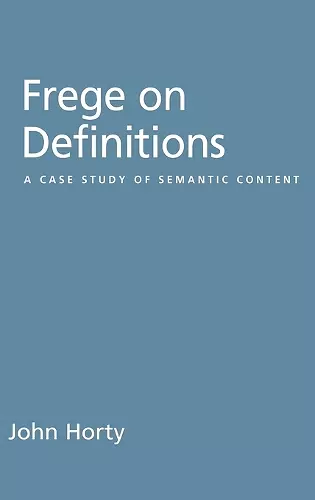Frege on Definitions
A Case Study of Semantic Content
Format:Hardback
Publisher:Oxford University Press Inc
Published:10th Apr '08
Currently unavailable, and unfortunately no date known when it will be back

In this short monograph, John Horty explores the difficulties presented for Gottlob Frege's semantic theory, as well as its modern descendents, by the treatment of defined expressions. The book begins by focusing on the psychological constraints governing Frege's notion of sense, or meaning, and argues that, given these constraints, even the treatment of simple stipulative definitions led Frege to important difficulties. Horty is able to suggest ways out of these difficulties that are both philosophically and logically plausible and Fregean in spirit. This discussion is then connected to a number of more familiar topics, such as indexicality and the discussion of concepts in recent theories of mind and language. In the latter part of the book, after introducing a simple semantic model of senses as procedures, Horty considers the problems that definitions present for Frege's idea that the sense of an expression should mirror its grammatical structure. The requirement can be satisfied, he argues, only if defined expressions--and incomplete expressions as well--are assigned senses of their own, rather than treated contextually. He then explores one way in which these senses might be reified within the procedural model, drawing on ideas from work in the semantics of computer programming languages. With its combination of technical semantics and history of philosophy, Horty's book tackles some of the hardest questions in the philosophy of language. It should interest philosophers, logicians, and linguists.
I think Horty's book is really excellent in every way. Horty's insights about Frege and his astute grasp of the philosophical and logical issues involved bear on almost every issue in Frege scholarship. His interpretation of Frege is quite charitable and plausible at the same time, showing how Frege's insights and intentions led him to important difficulties. Horty is then able to suggest ways out of those difficulties that are both philosophically and logically plausible and Fregean in spirit if not in letter. I think the book will be widely used in seminars, will be a must purchase for all research libraries, and will be quite influential. A wonderful book. * John Perry, Stanford University *
ISBN: 9780195314410
Dimensions: 155mm x 239mm x 20mm
Weight: 431g
176 pages